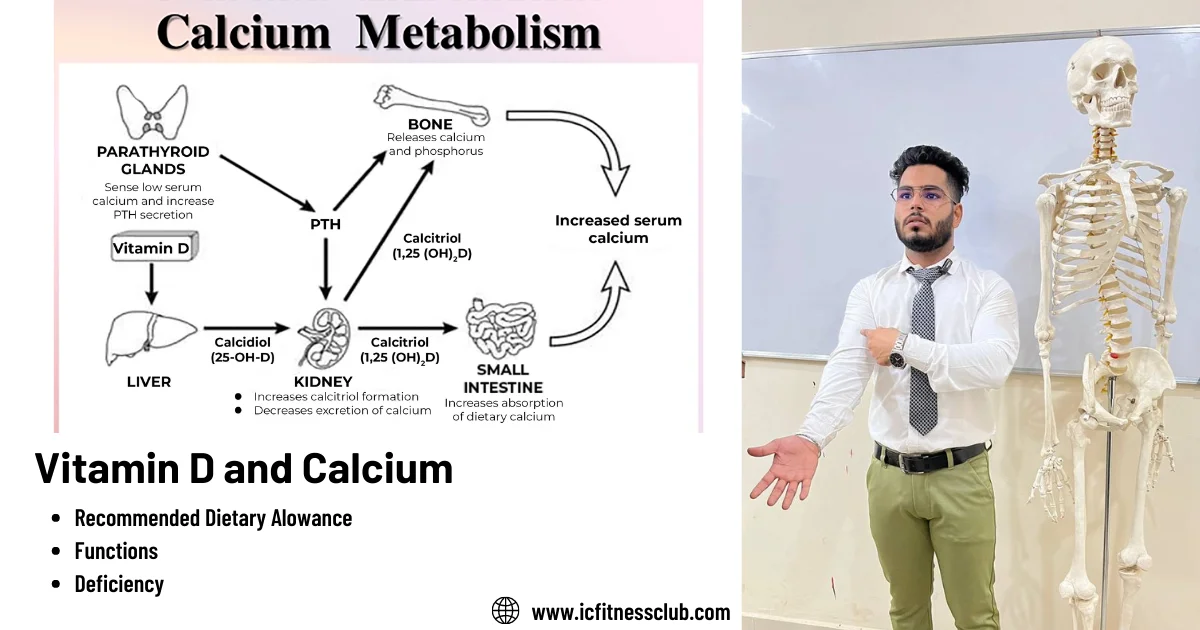Calcium and Vitamin D – IC Fitness Club
Calcium and vitamin D are two essential nutrients that work together to maintain strong and healthy bones. Calcium is a mineral that is vital for bone health, as well as for proper muscle and nerve function. Vitamin D is important for the absorption of calcium from the intestines and also helps to maintain proper levels of calcium in the blood.
Calcium is found in many foods, including dairy products, leafy green vegetables, and fortified foods such as cereal and orange juice. It is recommended that adults consume 1,000-1,200(recommended dietary allowance) milligrams of calcium per day, with higher amounts recommended for certain populations such as women over 50 and men over 70.
Vitamin D can be obtained through sun exposure, but it can also be found in some foods such as fatty fish and fortified foods like milk and cereal. The recommended daily intake of vitamin D is 600-800(recommended dietary allowance) international units (IU), but some people may require higher doses, especially if they have limited sun exposure or have conditions that affect vitamin D absorption.
Together, calcium and vitamin D play a critical role in bone health and should be consumed as part of a balanced diet or through supplements if necessary.
Calcium and vitamin D have several important functions in the body:
- Bone health: Calcium and vitamin D work together to build and maintain strong bones. Calcium is a key component of bone tissue, while vitamin D helps the body absorb and use calcium effectively.
- Muscle function: Calcium is also essential for proper muscle function, including the contraction and relaxation of muscles.
- Nerve function: Calcium helps transmit nerve signals throughout the body, and vitamin D is important for maintaining healthy nerve cells.
- Immune system function: Vitamin D plays a role in supporting the immune system and may help protect against certain diseases.
- Blood clotting: Calcium is important for the process of blood clotting, which helps to prevent excessive bleeding after injury.
- Hormone regulation: Calcium and vitamin D are both involved in the regulation of various hormones in the body, including those that control blood pressure and bone metabolism.
Overall, calcium and vitamin D are crucial nutrients for maintaining good health and preventing various diseases and health conditions. It’s important to consume adequate amounts of both nutrients through diet or supplements to support these important functions in the body.
Vitamin D Deficiency
Vitamin D deficiency occurs when the body does not have enough of this essential nutrient to function properly. This can happen for several reasons, including a lack of exposure to sunlight, poor dietary intake, or problems with vitamin D absorption. Some common signs and symptoms of vitamin D deficiency include:
- Weak bones: Vitamin D is essential for strong bones, and deficiency can lead to bone loss, osteoporosis, and an increased risk of fractures.
- Muscle weakness: Vitamin D plays a role in muscle function, and deficiency can lead to muscle weakness and fatigue.
- Increased risk of falls: Deficiency of vitamin D can increase the risk of falls, especially in older adults, due to weak bones and muscle weakness.
- Depression: Vitamin D has been linked to mood regulation, and deficiency may increase the risk of depression and other mood disorders.
- Impaired immune function: Vitamin D plays a role in the immune system, and deficiency may increase the risk of infections and autoimmune diseases.
- Chronic diseases: Some studies suggest that vitamin D deficiency may increase the risk of chronic diseases such as heart disease, diabetes, and certain types of cancer.
Treatment for vitamin D deficiency typically involves increasing vitamin D intake through diet or supplements and getting more sun exposure. In severe cases, prescription-strength vitamin D supplements may be necessary. If you suspect you may have a vitamin D deficiency, talk to your healthcare provider for advice and guidance.
Regulation of Calcium
The regulation of calcium in the body is a complex process that involves several organs, hormones, and cellular processes. Here’s a brief overview of how calcium is regulated:
- Intestines: Calcium is absorbed from food in the small intestine. The amount of calcium that is absorbed depends on the body’s needs and the presence of other nutrients, such as vitamin D.
- Bones: Calcium is stored in the bones, which serve as a reservoir for calcium. When the body needs calcium, it can be released from the bones.
- Kidneys: The kidneys help regulate calcium levels by reabsorbing or excreting calcium as needed. When calcium levels are low, the kidneys reabsorb more calcium from the urine to return it to the bloodstream. When calcium levels are high, the excess calcium is excreted in the urine.
- Parathyroid gland: The parathyroid gland produces a hormone called parathyroid hormone (PTH), which regulates calcium levels in the blood. When calcium levels are low, the parathyroid gland releases PTH, which stimulates the release of calcium from the bones, increases calcium absorption in the intestines, and reduces calcium excretion in the kidneys.
- Thyroid gland: The thyroid gland produces a hormone called calcitonin, which helps lower calcium levels in the blood. Calcitonin works by inhibiting the release of calcium from the bones and increasing calcium excretion in the kidneys.
- Vitamin D: Vitamin D plays a critical role in calcium regulation by promoting calcium absorption in the intestines. When calcium levels are low, the kidneys convert vitamin D into its active form, which stimulates the absorption of calcium from the intestines.
Overall, the regulation of calcium in the body is a complex process that involves several organs, hormones, and cellular processes. When calcium levels are too high or too low, it can lead to a variety of health problems, so it’s important to maintain a proper balance of calcium in the body.




